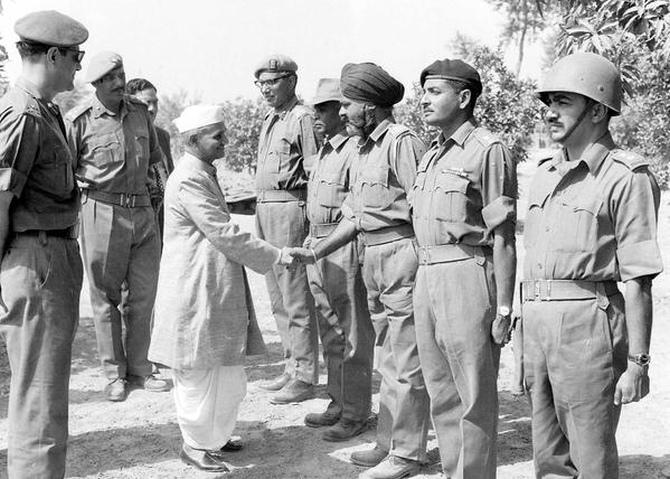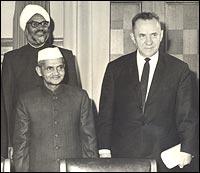But friendly words cannot tame a serpent. There is but one way to do it - to remove the serpent's fangs.
Even before the ink with which they had signed the Kutch agreement dried up, Pakisthan raised its hood to strike again. Pakistani soldiers entered Kashmir in disguise. In September 1965 there was a large-scale invasion of the territory by Pakistani soldiers in the Chhamb area. War broke out all along the Cease-fire Line on the Kashmir border.
 Without losing time he asked for the opening of a new front including Lahore. Retaliate with full force, he said. What I remember is that the historic meeting lasted less than five minutes. Arjan Singh, the then chief of the air force was present. He is the only surviving member from that meeting. He told them, "Be prepared for war." He called Defence Minister Y B Chavan and informed him of the decision. He responded positively and expressed his support. He didn't wait for international reactions. The next day, newspapers reported that the Indian army was marching towards Lahore. It was a big morale booster for the country.
Without losing time he asked for the opening of a new front including Lahore. Retaliate with full force, he said. What I remember is that the historic meeting lasted less than five minutes. Arjan Singh, the then chief of the air force was present. He is the only surviving member from that meeting. He told them, "Be prepared for war." He called Defence Minister Y B Chavan and informed him of the decision. He responded positively and expressed his support. He didn't wait for international reactions. The next day, newspapers reported that the Indian army was marching towards Lahore. It was a big morale booster for the country.
To mobilize the support of country during the war he coined the slogan of "Jai Jawan Jai Kisan". Addressing the nation on 13th August 1965 Shastriji referred to Pakistan's threats and said, "Force will be met with force." Two days later, during the celebration of Independence day, he declared from the ramparts of the Red Fort: "It does not matter if we are destroyed. We will fight to the last to maintain the high honor of the Indian nation and its flag."

Ayub was maintaining a vague stance by quoting UN resolutions. "Then you will have to find another PM," said Shastri during the arguments. In the final agreement General Ayub Khan had not mentioned those words but Shastri continued to press for it. Ayub finally wrote it at the very last moment. General Ayub's handwritten assurance is still preserved in the Indian archives. Shastri was a slight person but with a strong mind.
The war had established the supremacy of India and brought Ayub Khan on to his feet. The United Nations passed a resolution demanding a ceasefire. The Russian Prime Minister, Kosygin, offered to mediate and Shastri and Ayub Khan started negotiations at Tashkent. A `no-war' agreement was signed between the two countries on January 10, 1966, and peace was restored.
